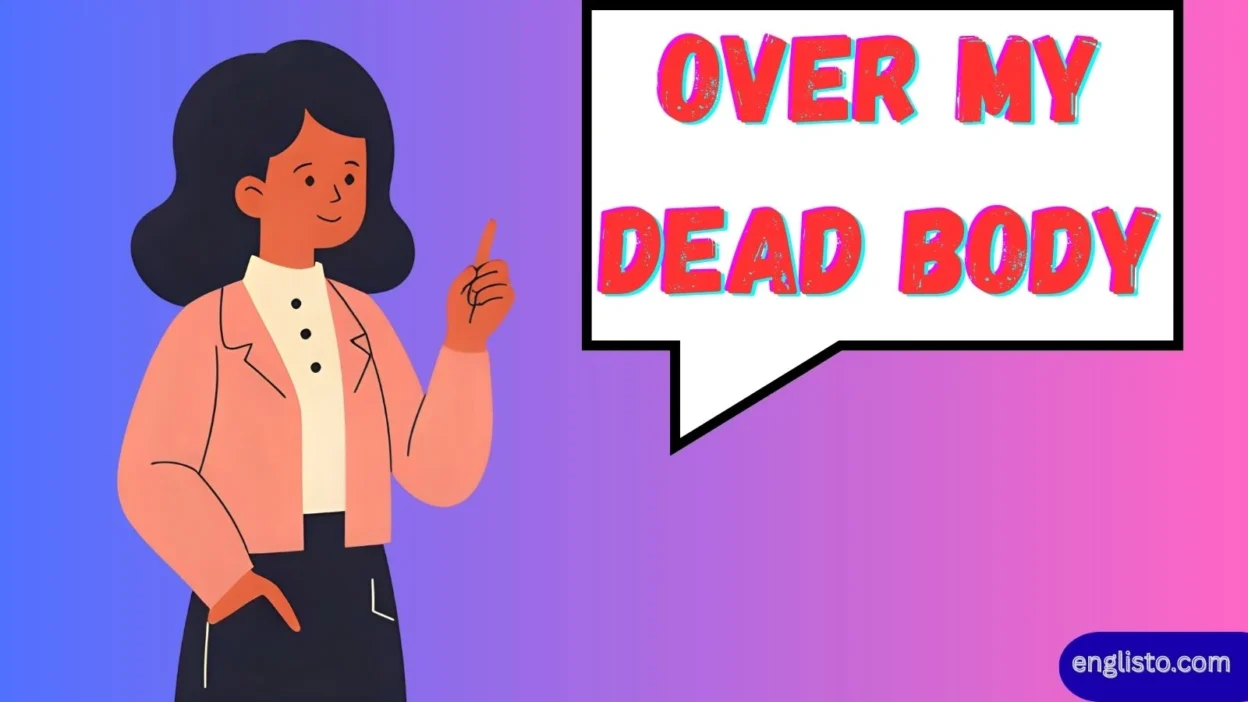Language has a way of packing strong emotions into short, punchy expressions. One idiom that does this perfectly is “over my dead body.” Whether it’s said in jest, in consternation, or in a moment of fierce determination, this phrase signals absolute refusal. If someone says it, you can bet they’re not backing down.
But where did it come from? How do people actually use it in daily life? Why does it still feel so powerful, even in casual conversations? Let’s dive deep into this fascinating idiom, exploring its history, meaning, usage, synonyms, and role in modern culture.
What Does “Over My Dead Body” Mean?
At its core, the idiom means:
“Something will happen only if I’m dead, because while I’m alive, I’ll do everything I can to prevent it.”
It’s a dramatic way to say “No way” or “Absolutely not.”
Think of it as an exaggerated, almost theatrical refusal. Instead of simply saying, “I don’t agree,” or “That won’t happen,” someone uses “over my dead body” to emphasize the depth of their opposition.
Example Sentences in Everyday Speech
- Joe says: “I’m going to buy a motorbike.”
His mother replies: “Over my dead body!” - Friend 1: “Let’s drop out of high school.”
Friend 2: “Over my dead body. I’m not throwing away my future.” - Sally and Alice: “We’re going to join the circus!”
Father, smiling but firm: “Over my dead body.”
In each case, the speaker isn’t just refusing; they’re drawing a boundary, often out of love, care, or serious objection.
Read More: I Feel Myself – Idiom Explained: Meaning, Usage, and Cultural Insights
The Origin of “Over My Dead Body”
Idioms usually have fascinating histories, and this one is no exception.
- Early Roots: Scholars suggest the idiom appeared in the early 1800s, likely in America or England.
- Hyperbolic Tradition: It belongs to a class of hyperbolic expressions—dramatic, exaggerated phrases that add weight and emotion to speech.
- First Recorded Use: Evidence points to the early-nineteenth-century, with plays, speeches, and literature dramatizing personal resolve with similar phrases.
A famous literary reference is found in H. Brighouse’s one-act play, where characters use similar exaggerated refusals to highlight determination.
Historical Context
In earlier centuries, ideas of honor, defiance, and personal vows were taken seriously. To say “over my dead body” was almost a knight’s declaration, a promise to defend values, family, or property at the cost of life itself.
This seriousness, combined with a bit of humor, allowed the phrase to survive and evolve into everyday English.
Why People Say It: Emotional and Social Context
The idiom isn’t just about words; it carries strong emotional undertones. Depending on tone, it can mean:
- Protective Love: A parent refusing to let their child make a harmful choice.
- Stubborn Opposition: A person determined not to allow something under any circumstances.
- Humorous Banter: Friends joking about doing something outrageous.
The Emotional Spectrum
| Tone of Voice | Meaning in Context | Example |
| Serious & Stern | Absolute refusal, protective stance | “Over my dead body will you drop out of school.” |
| Light & Joking | Friendly teasing | “Over my dead body will you get the last slice of pizza.” |
| Defiant | Strong opposition, refusal to yield | “Over my dead body will they cut down those trees.” |
| Dramatic | Adds flair to conversation | “Over my dead body will you tattoo that on your arm.” |
Synonyms and Related Expressions
Language is rich with alternatives that carry a similar meaning. Here are some common ones:
| Idiom / Phrase | Similar Meaning | Tone |
| “No way” | Absolute refusal | Neutral |
| “Not on my watch” | Protective refusal | Serious |
| “When pigs fly” | Impossible scenario | Humorous |
| “Fat chance” | Dismissive rejection | Sarcastic |
| “Over my lifeless body” | Direct synonym | Dramatic |
These expressions all convey resistance, but “over my dead body” stands out because of its intensity and imagery.
Real-Life Usage in Conversations
Let’s see how the idiom works in daily life:
- Family Setting:
Daughter: “Dad, I want to get a tattoo.”
Dad: “Over my dead body!” - Workplace Setting:
Employee: “Let’s cut corners on this project.”
Boss: “Over my dead body will we compromise quality.” - Friendship Setting:
Tom: “Let’s go swimming in the lake tonight after drinking.”
Sarah: “Over my dead body. That’s way too dangerous.”
Notice how in each context, the phrase shows not just disagreement but personal commitment to stopping the action.
Grammar and Structure of the Idiom
The structure is straightforward:
Over + My + Dead + Body
- Over: Suggests something must pass “across” or “beyond.”
- My Dead Body: A metaphorical barrier, representing the speaker’s life, will, or resistance.
It’s typically used as a standalone exclamation but can also fit into sentences:
- Exclamation: “Over my dead body!”
- Within a sentence: “She’ll marry him over my dead body.”
Fun Grammar Note
The phrase is an example of metonymy (using a related image—death—to represent refusal). It’s also a form of hyperbole (deliberate exaggeration).
The Idiom in Pop Culture
“Over my dead body” has appeared in movies, songs, and books, giving it a lasting presence in pop culture.
- Movies: Often used in dramatic arguments between characters.
- Songs: Featured in lyrics to express defiance or resistance.
- Journalism: Headlines frequently use the phrase to grab attention.
For instance, the Los Angeles Times once ran with a piece highlighting a political refusal, quoting “Over my dead body” as a strong stand.
Interesting Facts About the Idiom
- It has been used in political speeches, where leaders declare absolute opposition to policies.
- The idiom is listed in multiple dictionaries, including American Heritage Dictionary of Idioms, Collins COBUILD, and Oxford English Dictionary.
- Sometimes abbreviated as OMDB in casual online slang.
- It’s informal but powerful, making it common in both serious debates and lighthearted banter.
Usage in Different Cultures
While “over my dead body” is English, many cultures have their own versions.
- French: “Plutôt mourir que de…” (I’d rather die than…)
- Spanish: “Por encima de mi cadáver.”
- German: “Über meine Leiche.”
This shows how universal the idea is—people everywhere dramatize refusal with imagery of death or sacrifice.
FAQs about “Over My Dead Body”
Q1: Is “over my dead body” always serious?
No, it depends on the tone. It can be serious, humorous, or even sarcastic.
Q2: Is it polite to use this idiom?
Not really. It’s forceful, so use it carefully in formal settings.
Q3: What’s the difference between “no way” and “over my dead body”?
“No way” is casual. “Over my dead body” is dramatic and emphatic.
Q4: Can you use this idiom in writing?
Yes, but it works best in dialogue, opinion pieces, or dramatic writing.
Q5: When did the idiom become common?
It became widespread in the 1800s and remains popular today.
Conclusion
The idiom “over my dead body” is more than just words. It’s a bold declaration of refusal, protection, or determination. From parents defending their kids’ choices to politicians resisting policies, the phrase carries weight across contexts.
It’s survived centuries because it packs emotion, humor, and clarity into just four words. Whether you hear it in a movie, a heated argument, or a joke among friends, you’ll know the speaker means business.
So the next time someone tries to push you into something you’ll never agree to, you know what to say:
“Over my dead body.”



